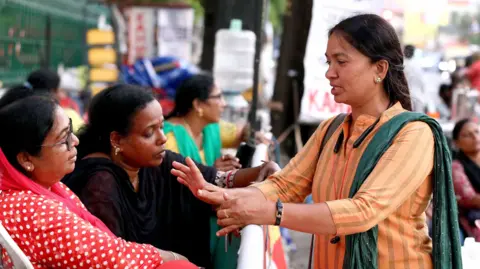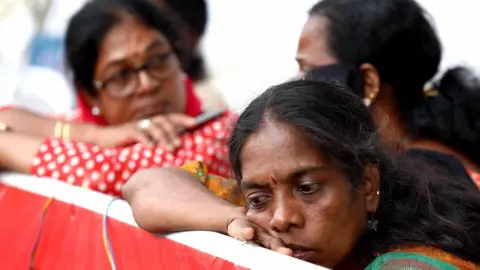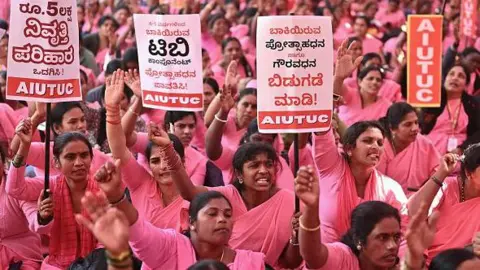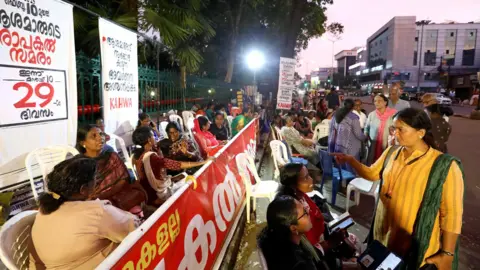Indian health workers protest better salary and recognition

Thiruvananthapuram
 Vivek R Nair/BBC
Vivek R Nair/BBCThousands of frontline healthcare workers in Kerala, southern India, have been seeking better salaries and accredited demonstrations, vowing to continue protesting.
26,225 female workers in Kerala, known as recognized social health activist or Ashas (Hindi Hope), have been protesting near the state government headquarters in the capital Thiruvananthapuram.
Protesters who provide important medical support in rural areas of the country say they plan to “siege” the state secretariat next week if authorities continue to ignore their requests.
More than one million Ashas across the country are fighting for better salaries and official “worker” status.
These women are currently classified as volunteers, meaning that despite playing a crucial role in providing health care in rural and underserved areas, she does not guarantee any benefit to the government.
On Monday, MP Shashi Tharoor from Kerala said ASHA volunteers were the “unsung hero” of India’s health care system, and “the protests underestimate the systematic underestimation of community health workers in India, especially in Kerala”.
The Indian federal health minister recently told parliament that the government will raise incentives for workers. Meanwhile, Kerala authorities have issued three months of pending payments.
The state’s health minister also said Kerala would ask the federal government to recognize the women as ordinary workers rather than volunteers.
However, the state government insists that the funding it provides to ASHA is the highest in the country.
 Vivek R Nair/BBC
Vivek R Nair/BBCBut protesters said state authorities did not hold talks with them, but accused them of using tactics to suppress the protests.
This week, police removed protesters strapped plastic tarpaulins to their heads at sit-ins, exposing them to the sun.
Ashas received a remuneration of Rs 7,000 instead of a salary because they were volunteers rather than workers and they wanted them to want payments to increase to Rs 21,000 ($240.8; £186.2) and retirement benefits.
However, state health minister Veena George said 90% of Ashas earn Rs 10,000-13,500 per month, including incentives.
“They have the right to maternity leave and take steps to prevent excessive workloads,” she said.
But some protesting women oppose these claims.
Kuzhipparamba, one of the protesters, said she said she received only Rs 6,300 as a remuneration in October 2024.
“They deducted Rs 700 for the meeting I missed because I was sick and had to go to the hospital.”
She said when the 45-year-old joined Ashas 17 years ago, she only worked one or two hours a day.
“Now I feel so burdened with my work that it’s not enough for the whole day,” she told the BBC.
“This is a matter of social justice,” Saboora Arifa, one of the ASHA protest coordinators, told the BBC. “People who work for eight hours a day are not volunteers. We have the right to worker status.”
 Getty Images
Getty ImagesIn a country with millions of Indians, especially in remote areas, lacking access to quality health care, ASHA workers have played a crucial role over the years.
Their work involves door-to-door raising awareness about nutrition, hygiene, immunity and the provision of newborn and prenatal care, among others.
They played a vital role during the shared pandemic, especially in Kerala, where the first Covid case was reported and considered commendable for the successful outbreak of Zika and Nipah viruses.
Melbourne-based public health policy analyst Dr Joe Thomas believes India should change its perception of these community health workers whose contribution to primary health is generally recognized.
He told the BBC that the workers are working as midwifes in Kerala after midwife freezes midwife. “Maternal care support has gradually shifted to Ashs.”
According to him, 90% of women in Kerala are in prenatal care, such as testing, nutritional supplements and advice from ASHA volunteers.
“Kerala is proud to achieve 99% of the vaccination,” Dr Thomas said. “The honor of successful vaccination is ASHAS. Their contribution to Kerala’s primary health is that they are the only people engaged in prevention.”
 Vivek R Nair/BBC
Vivek R Nair/BBCThe protests in Kerala are just the latest in a series of protests among these community health workers in India.
The neighboring Karnataka state increased its remuneration to Rs 10,000 earlier this year after ASHA volunteers went on strike.
Last year, volunteers in Andhra Pradesh held several statewide protests. This month, the state became the first in the country to offer its workers a reward of 150,000 rupees ($1,723; 1,330) to its workers, along with 180 days of paid maternity leave and raise the retirement age from 60 to 62 years old.




